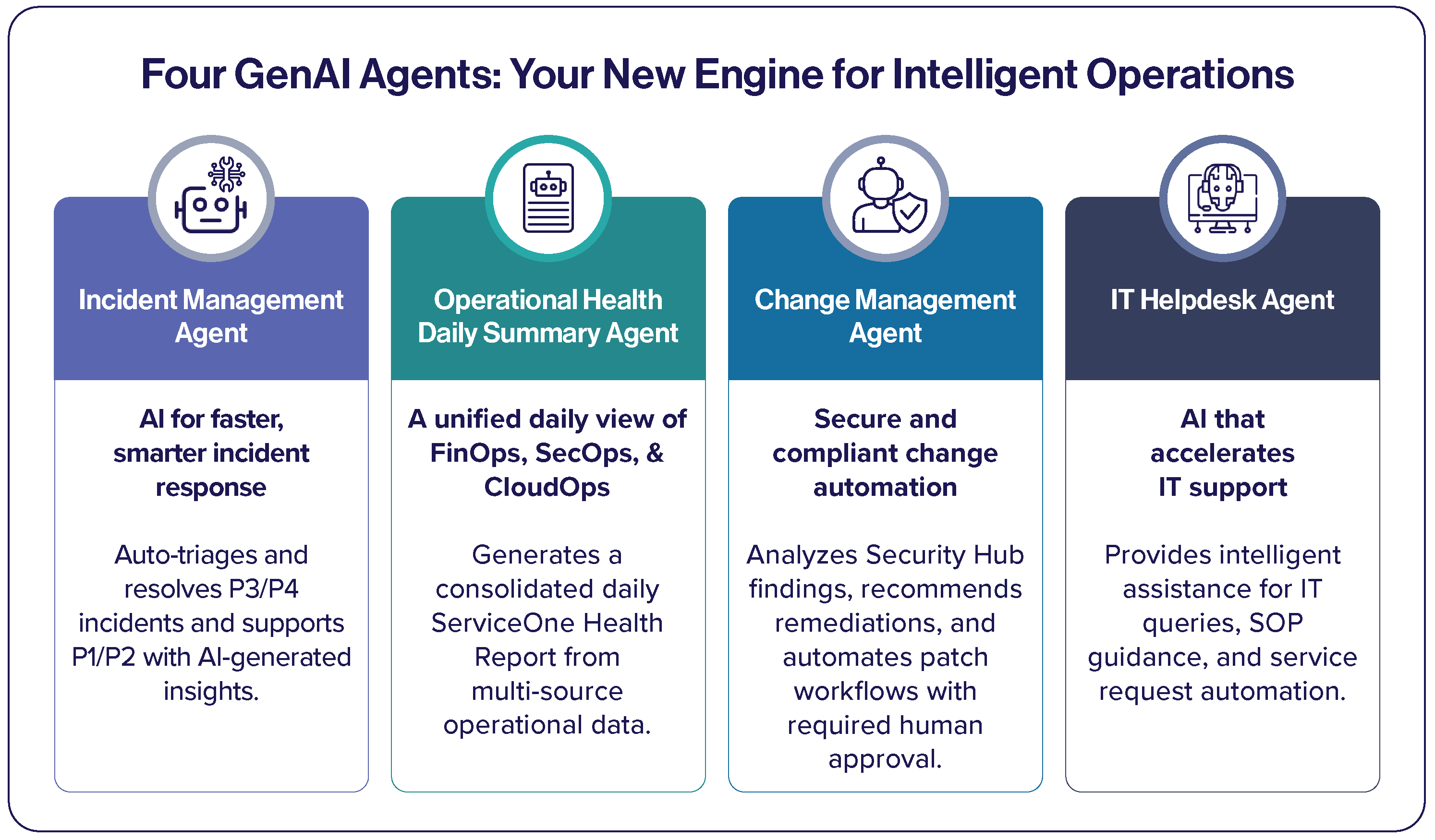Introduction
IT operations today span incidents, security, cost governance, and change control, creating a distributed and complex environment. Modern enterprises need to not just manage this landscape but to optimize, automate, and streamline operations with intelligence and speed.
Relevance Lab’s ServiceOne GenAI Platform addresses this head-on by bringing together intelligence, automation, and human collaboration through a unified suite of AI-powered operational agents.
Each agent provides domain-specific intelligence that helps teams move from manual and reactive operations to predictive, efficient, and scalable CloudOps and AIOps.
The Vision: From Reactive to Predictive Operations
Traditional IT and Cloud operations rely heavily on manual triaging, static dashboards, and after-the-fact reporting. This leads to inefficiency, delays, and missed opportunities for cost and performance optimization.
GenAI-powered AIOps transforms this model by turning raw operational data into real-time, actionable insights. With advanced reasoning, summarization, and contextual understanding, AI can automate up to 70% of day-to-day tasks and help teams resolve critical incidents faster and with greater accuracy.
ServiceOne GenAI Agents were designed specifically to enable this transformation.
Meet the Four ServiceOne GenAI Agents
These agents are purpose-built to enhance CloudOps and AIOps maturity through domain-specific intelligence and seamless integration across enterprise tools.

1. Incident Management Agent
"AI that diagnoses, summarizes, and recommends — so your engineers focus on what truly matters."
The Incident Management Agent acts as the first responder in your operations center. It automatically triages and resolves P3/P4 incidents while assisting humans on P1/P2 issues with AI-generated insights.
Key Capabilities:
- Auto-diagnosis using log, metric, and alert correlation
- Incident summarization for quick human review
- Root cause and remediation recommendation
- Integration with ServiceNow, CloudWatch, Datadog, PagerDuty
Impact:
- 70% of minor incidents closed automatically
- 30–50% reduction in Mean Time To Resolution (MTTR)
- Root cause analysis reports generated in seconds instead of hours
2. Operational Health Daily Summary Agent
“One unified AI-powered report for FinOps, SecOps, and CloudOps — every morning.”
Every 24 hours, the Operational Health Daily Summary Agent compiles data from multiple sources to deliver a consolidated ServiceOne Health Report.
This isn’t just a dashboard — it’s a conversation starter between teams, driven by GenAI intelligence.
Key Capabilities:
- FinOps: Cost anomaly detection and savings recommendations
- SecOps: Risk detection and mitigation planning
- CloudOps: Performance bottleneck analysis and optimization hints
- Natural language summarization of complex telemetry dat
Impact:
- Unified operational awareness
- 80% reduction in data-to-action time
- Preventive measures identified before incidents occur
3. Change Management Agent
“Secure, compliant, and intelligent change automation with human oversight.”
The Change Management Agent modernizes the patching and compliance process by combining automation with structured approval governance.
It interprets findings from security tools, recommends appropriate remediations, and can execute patching workflows with human-in-loop approvals where required.
Key Capabilities:
- AI-based interpretation of vulnerabilities
- Auto-generation of remediation playbooks
- Approval and compliance workflows integrated with ITSM systems
- Patching orchestration through AWS Systems Manager or Ansible
Impact:
- 40% faster patch cycles
- Reduced risk of human error
- Continuous compliance and audit readiness
4. IT Helpdesk Agent
"Your AI IT assistant for faster responses and smarter resolutions."
The IT Helpdesk Agent supports internal teams by acting as an intelligent assistant for day-to-day IT queries, SOP guidance, and routine service request automation.
It reduces manual workload while improving the speed and quality of employee support.
Key Capabilities:
- Autonomous handling of P3/P4 IT requests (VPN, password resets, access provisioning)
- Policy, process, and SOP responses powered by Retrieval-Augmented Generation (RAG)
- Escalation of complex tickets to humans with complete context
- Integrations with ServiceNow, Okta, and Microsoft Teams
Impact:
- Up to 60% automation of repetitive helpdesk tasks
- Improved employee satisfaction and faster response times
- Continuous learning from ticket outcomes
Unified ServiceOne Architecture
At the heart of these agents lies a shared intelligence core, built on a modular architecture designed for scale, compliance, and seamless enterprise integration.
Architecture Components:
- GenAI Core: Foundation models fine-tuned for operational reasoning
- Knowledge Graph: Mapped relationships across assets, incidents, changes, and SOPs
- Integration Layer: APIs that connect with ITSM systems, observability tools, cloud platforms, and security solutions
- Orchestration Engine: Automated workflows for task execution and approval governance
This unified design ensures every agent operates with shared operational context, enabling cross-domain intelligence, such as correlating a FinOps cost anomaly with a CloudOps performance issue.
Why GenAI Is a Game-Changer for AIOps
Traditional AIOps focused on correlation and visualization.
GenAI adds context, reasoning, and autonomy.
What GenAI enables:
- Natural Language Interfaces: Engineers and managers can ask “What caused yesterday’s latency spike?” and get summarized root cause reports
- Continuous Learning: The system evolves from past tickets, incidents, and outcomes
- Predictive Recommendations: Moves from reactive resolution to proactive prevention
- Human-in-the-Loop Safety: Critical changes are always reviewed before execution
This combination unlocks operational efficiency, cost reduction, and improved reliability at enterprise scale.
Business Impact
Quantifiable Results:
- Up to 40% cost optimization opportunities surfaced via FinOps intelligence
- MTTR reduction by 50% through automated incident handling
- Faster compliance remediation with AI-driven patch automation
- Improved productivity across IT and Operations by automating routine tasks
The Road Ahead: Towards Autonomous CloudOps
The ServiceOne ecosystem is designed as an extensible platform, with future agents planned in areas such as predictive capacity planning, AI-driven Cloud Security Posture Management (CSPM), and Governance-as-Code.
By embedding GenAI deeply into operational workflows, ServiceOne enables organizations to advance through the maturity curve from: Manual → Assisted → Autonomous.
Conclusion
ServiceOne’s GenAI Agents are more than automation tools; they function as intelligent collaborators across the operational lifecycle. They bridge the gap between data and decision-making, between operations and optimization, and between human expertise and intelligent automation.
By unifying Incident Management, Operational Health, Change Management, and IT Helpdesk capabilities within a single AI-driven platform, ServiceOne is redefining what AIOps can deliver for modern enterprises.
See how ServiceOne GenAI can transform your operations. Talk to our team and accelerate your journey toward intelligent, automated CloudOps.

